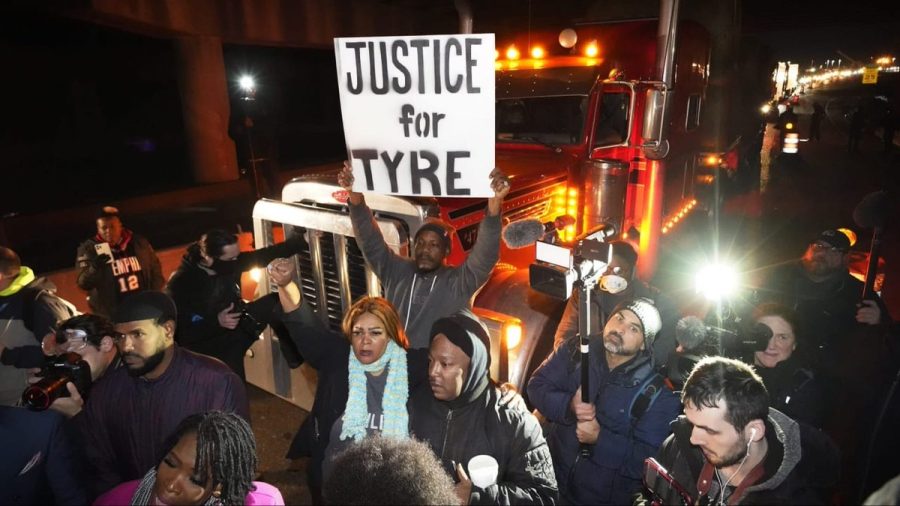Body Cameras Won’t Stop Police Brutality — Accountability Will
The brutal assault of 29-year-old Tyre Nichols on Jan. 7 at the hands of five Memphis police officers has led to a reinvigorated discussion of police brutality — and what needs to be done to stop it. For years, many different solutions have been suggested by the public, including the reallocation of police funds towards social programs, implicit-bias training and the use of body cameras. The body camera argument is particularly popular, as it gained traction after the death of Breonna Taylor and the misinformation that followed.
Body cameras are simply not enough to stop police brutality. Systemic changes — not just the reallocation of funds to different bureaucratic areas — need to be made in order to actually hold police officers accountable, especially when their superiors won’t.
In the case of Nichols’ death, the officers involved were members of SCORPION, ironically an anti-violence unit short for Street Crimes Operation to Restore Peace in Our Neighborhoods. In total, 40 officers were members of SCORPION before the unit’s disbandment after discussions with Nichols’ family and community members.
Memphis higher-ups were quick to defend the unit, with Police Chief Cerelyn Davis claiming that SCORPION “had great success” in reducing the record number of crimes the city has seen. Davis claimed that the department was “unaware” of any evidence that the unit’s members had previously engaged in similar behavior.
Monterrious Harris, another Memphis resident, was attacked by the same officers only three days before Nichols’ death. The body cameras didn’t stop the officers from attacking Nichols, and body camera footage wasn’t mentioned at all regarding the Harris case. What’s the point of looking toward body cameras as the key to preventing police brutality when they’re not being used to their fullest extent?
The crucial issue in the brutality debate is the fact that officers aren’t always held accountable for their actions. The Nichols case is an example of an exception to the rule. More often than not, cases like Harris’ and others are closer to the norm: the victims and their cases receive little to no publicity as officers involved sweep unsavory incidents under the rug.
The best-case scenario is for the Memphis Police Department is that Nichols’ attack and the recent SCORPION altercations that the attack brought to light highlight gross mismanagement within the department. At worst, it implies that higher-ups knew of the misconduct, did nothing to stop it and potentially even took part in it.
Additionally, based on information from the ACLU, public reception towards the use of body cameras is mixed at best, with few claiming that cameras are making a positive difference and others claiming that they’re a blight on taxpayer dollars that violate the right to privacy. As of right now, the general consensus is that money going towards purchasing and maintaining cameras could likely be put to better use elsewhere. I’m inclined to agree with this, especially within cities where the police budget seems to continue to grow without a dwindling crime rate to back it up.
Take a look at the Memphis police budget, for example. The SCORPION division had an annual budget of over $28 million, and the Memphis police department as a whole had a budget of $275.7 million in 2023 — 39% of the city’s total budget. How much of that budget is going towards maintaining ethical police training standards, towards psychological resources for said officers or any way to hold them accountable for their actions?
According to a Gallup poll rating Americans’ confidence in major U.S. institutions, public trust in the police has dropped several points between 2021 and 2022. Less than half of the people polled still hold confidence within the police system; and who can blame them?
There are four 12-week basic police training academies for the state of Tennessee, and the only prerequisites are to have a high school diploma/GED, a clean felony record and to not have a dishonorable discharge from the military, along with the vague requirement of “possessing good moral character.”
The required length of police training should be extended to allow for people to learn how to be effective officers without resorting to violence in cases where it isn’t necessary. Nichols may have run away from the SCORPION officers, but does that constitute a three-minute bombardment on him?
I hope that there’s a silver lining within this situation; that in spite of the tragic death of a man taken too soon, real change within our police systems will be enacted.
Except the same thing was said about George Floyd, Breonna Taylor and countless other victims of policy brutality. In each of these cases, the officers were charged, protests took place and the world moved on. I want to think this case is different, but realistically I know it won’t be. When someone says “enough is enough,” when do they actually mean it?
In spite of all of the protests, the grassroots campaigns with tens of thousands of supporters, even with members of the (albeit ineffectual) government supporting said campaigns, the number of fatal police shootings continues to rise every year. Nothing is going to change until the system itself does.
Damien Moshman, FCRH ’25, is a political science and journalism major from Princeton, N.J.










































































































































































































